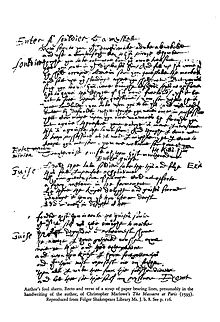Foul papers are an author's working drafts. The term is most often used in the study of the plays of Shakespeare and other dramatists of English Renaissance drama. Once the composition of a play was finished, a transcript or "fair copy" of the foul papers was prepared, by the author or by a scribe.
Few sets of foul papers actually exist from the era in question. Of the relatively small number of dramas that are extant in manuscript, the majority are from the Caroline era rather than the Jacobean or Elizabethan, and most are fair copies of plays by professional scribes like Ralph Crane. In a rare direct reference to foul papers and fair copies, Robert Daborne mentions both in a November 1613 letter to theatrical manager Philip Henslowe: "I send you the foul sheet and the fair I was writing" â€" which appears to indicate that Daborne prepared a fair copy of his working drafts as he wrote.
The best example of a set of foul papers from Shakespeare's era is the manuscript of Sir Thomas More.
Notes

Sources

- Chambers, E. K. The Elizabethan Stage. 4 Volumes, Oxford, Clarendon Press, 1923.
- Halliday, F. E. A Shakespeare Companion 1564â€"1964. Baltimore, Penguin, 1964.
External links
- One reference
